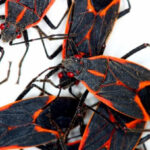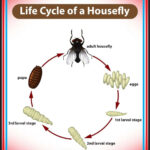Large flies buzzing around your living space can be more than just an annoyance; they often signal underlying issues that need your attention. While house flies play a crucial role in our ecosystem as decomposers of organic waste, their presence indoors, especially in large numbers, can be a cause for concern.
These pests are not merely a nuisance; they can carry diseases and indicate potential sanitation problems or structural weaknesses in your home. Addressing a fly problem promptly is key to preventing it from becoming a full-blown infestation. Typically, flies are outdoor insects, but they can easily find their way inside through open windows and doors.
While seeing a few flies occasionally might be normal, a sudden influx of flies should raise a red flag. A fly infestation can quickly become a serious problem. Flies can transmit pathogens, potentially spreading diseases throughout your home and posing health risks to you and your family.
Decoding Fly Behavior: What Attracts Them Indoors?
Flies are insects belonging to the order Diptera, easily identified by their single pair of wings. Understanding their behavior is essential for effectively managing infestations. Flies are naturally drawn to environments that offer abundant food sources and suitable breeding grounds. Common types of flies you might encounter indoors include house flies (Musca domestica), fruit flies (Drosophila spp.), and drain flies (Psychodidae spp.).
House flies are particularly attracted to decaying organic matter, where they lay hundreds of eggs in moist locations like garbage bins, pet waste, or compost. Fruit flies are lured by ripe or fermenting fruits and vegetables, as well as sugary spills such as juice or soda. Drain flies, as their name suggests, thrive in damp environments such as clogged drains, sewage systems, and areas with standing water.
Common Reasons Behind a Fly Infestation in Your Home
If you’re overwhelmed by the number of flies in your house, you’re likely wondering, “Why are flies suddenly in my house?” and “Where are these flies coming from?” Several factors can contribute to a surge in indoor fly populations.
Below, we will explore some of the most prevalent reasons why flies invade homes and provide actionable solutions to help you get rid of flies effectively.
Decaying Organic Material: A Fly Magnet
Decomposing organic matter is a primary attractant for flies, often leading to infestations both inside and around your property. As mentioned earlier, flies are scavengers, feeding on dead and decaying substances. When flies locate such material, they are drawn to it as a food source. Furthermore, adult flies use this decaying matter as a breeding site, laying numerous eggs in it.
Sources of decaying matter that can attract flies include dead animals (like rodents trapped in walls), rotting meat left out, or uncovered compost bins. Structural vulnerabilities, such as cracks in walls or poorly sealed windows, can serve as entry points for flies seeking food, warmth, or shelter. Areas with stagnant water, blocked drains, or consistently damp conditions also create ideal breeding grounds for various fly species.
Warm Temperatures: Ideal Breeding Conditions
Flies require specific temperature conditions for their eggs to successfully hatch and develop. When these conditions are met, eggs will develop into larvae, which then mature into adult flies, continuing the life cycle. As previously noted, flies typically lay their eggs in decaying organic material.
However, warmth is another critical factor for their survival and development. Generally, temperatures of 75 degrees Fahrenheit (around 24 degrees Celsius) and higher are optimal for most fly species to breed. If you’re experiencing a fly problem in your home, inspect areas that are consistently warm and potentially humid, as these can be favorable for fly egg development.
Examples of warm spots inside a house that can encourage fly breeding include:
- Bathrooms, especially if poorly ventilated
- Laundry rooms, due to humidity and warmth from appliances
- Spaces around appliances that generate heat, like refrigerators and ovens
- Hot water heater closets or areas
- Dishwasher surroundings, where moisture and warmth can accumulate
Rapid Life Cycle and Breeding Rate
It might be surprising to learn that the lifespan of a fly is longer than many people assume. The average house fly can live for 15 to 30 days. Moreover, flies reproduce at an astonishing rate. How does this extended lifespan combined with rapid breeding contribute to sudden fly infestations in your home?
If you notice a few flies, or even just one, and don’t take action to eliminate it, it has the potential to lay eggs. These eggs will then hatch and develop into adult house flies. These new adults will, in turn, lay more eggs, and before long, a minor issue can escalate into a significant fly infestation. It’s important to understand that a single fly can be the starting point of a much larger problem.
Practical Tips to Get Rid of Flies in Your House
Preventing and controlling fly infestations involves a combination of proactive measures, diligent cleaning practices, and targeted pest management strategies. Here are effective steps you can take to combat fly problems in your home:
- Sanitation and Waste Management: Maintain cleanliness rigorously! Regular trash removal is essential, and it’s equally important to clean trash cans frequently. Garbage is a primary food source for flies, so reducing access to it is crucial.
- Temperature and Humidity Control: Lower the temperature and humidity in areas where flies are prevalent. Use dehumidifiers and fans to create an unfavorable environment for fly larvae to develop.
- Seal Entry Points: Thoroughly inspect your home’s exterior and seal any cracks, gaps, and holes in walls, windows, and doors. Install or repair window and door screens to physically block flies from entering your house.
- Proper Food Storage and Cleanup: Store food items, especially fruits and vegetables, in sealed containers to prevent flies from accessing them. Clean up spills and crumbs immediately, particularly in kitchens and dining areas.
- Utilize Fly Traps and UV Light Devices: Employ fly traps to capture existing flies. UV light fly traps are especially effective for larger fly species like blowflies and cluster flies. Consider using sticky flypaper or DIY bottle traps as well.
- Maintain Drains: Repair any leaking pipes, faucets, or other sources of standing water promptly. Ensure proper drainage around your property to eliminate potential fly breeding sites. Regularly clean clogged drains to remove organic buildup that drain flies feed on and breed in.
- Act Immediately: Take swift action at the first sign of flies. Addressing even a single fly can prevent it from laying eggs and starting an infestation.
When to Consider Professional Pest Control
While many fly infestations can be managed effectively with DIY methods, certain situations may require professional pest control intervention. Consider contacting pest control experts if:
- The fly problem persists despite your control efforts.
- The source of the infestation is difficult to locate or is inaccessible (e.g., inside walls).
- You have health or safety concerns related to the infestation.
- The infestation involves fly species that are particularly harmful or are considered nuisance flies that are hard to manage.
Professional pest control services can accurately assess the extent of the infestation, pinpoint the contributing factors, and implement targeted strategies to eradicate flies safely and efficiently. They can also provide valuable advice on preventive measures to minimize the risk of future fly problems.
Are you struggling with fly control in Omaha or nearby areas? If you need help to get rid of house flies, Contact ABC Termite and Pest Control for expert solutions to effectively manage your fly issue.
Further Reading: Comprehensive Guide on Dealing with Housefly Infestations
Partner with a Trusted Pest Control Expert: ABC Termite & Pest Control
For reliable pest management services in Omaha, NE (Omaha Office) and Lincoln, NE (Lincoln Office), choose a reputable pest control company you can trust. While DIY approaches can be tempting to save money, incorrect or improper pest control applications can have serious and harmful consequences for your family and pets. Contact ABC Termite & Pest Control today to consult with experienced exterminators in Omaha & Lincoln, NE!

